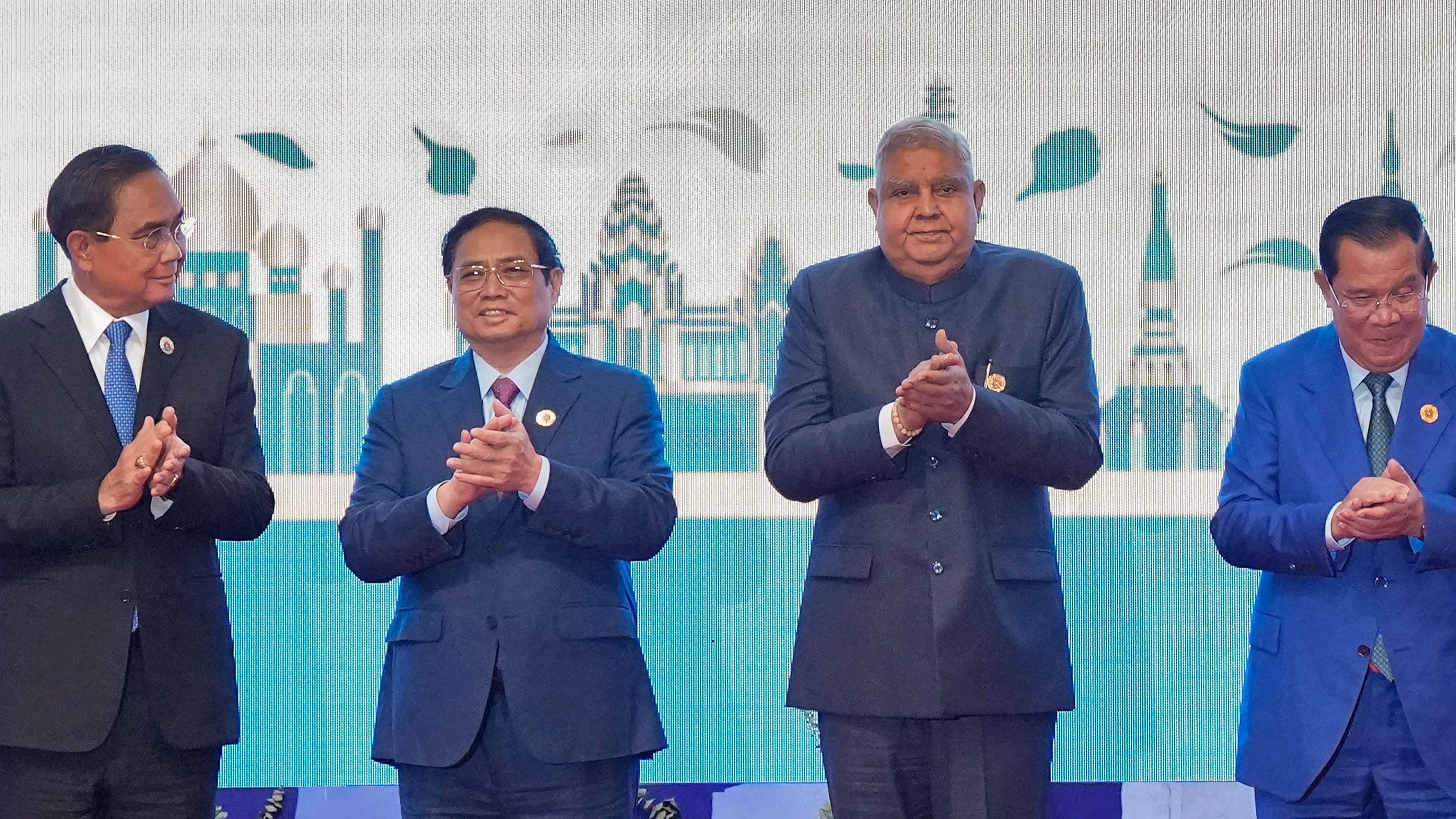
India on Saturday elevated its 30-year-long ties with the Association of South-East Asian Nations (ASEAN) to a Comprehensive Strategic Partnership even as it moved to add more military heft to the relations with a maritime war drill with all the 10 countries of the bloc early next year.
New Delhi’s move to step up maritime security cooperation with the 10 South East Asian nations came amid China’s growing belligerence, not only along its disputed boundary with India in the Himalayas, but also in the Indian Ocean, the South China Sea, the East China Sea, the Taiwan Strait and elsewhere in the Indo-Pacific region.
The defence ministers of India and the 10 ASEAN nations will also hold a meeting later this month.
Vice President Jagdeep Dhankhar attended the 19th India-ASEAN summit with the leaders of Brunei, Cambodia, Indonesia, Laos, Malaysia, Myanmar, the Philippines, Singapore, Thailand, and Vietnam at Phnom Penh.
They agreed to advance maritime cooperation, including in maritime security, countering piracy and armed robbery against ships, maritime safety, and search and rescue operations, humanitarian assistance, disaster management, and emergency response and relief.
India and the 10 ASEAN nations will also enhance cooperation against terrorism and transnational crimes including international economic crimes and money laundering, cybercrime, drugs and human trafficking and arms smuggling.
The cybersecurity cooperation between India and the ASEAN will entail establishing new dialogue platforms. India will work closely with the ASEAN-Singapore Cybersecurity Centre of Excellence and the ADMM (ASEAN Defence Ministers Meeting) Cybersecurity and Information Centre of Excellence, according to a joint statement issued after the vice president’s meeting with the leaders of the South-East Asian nations.
They also decided to expedite the review of the ASEAN-India Trade in Goods Agreement (AITIGA) to make it more user-friendly, simple and trade-facilitative.
The ATIGA came into force in January 2010.
New Delhi is keen to review the agreement and introduce more safeguards to make it sure that China can no longer take advantage of the trade concessions India offers to the South-East Asian nations.
The merchandise trade and investment flows between the ASEAN and India stood at $97 billion and $2 billion respectively in 2019 – just before the Covid-19 pandemic hit the world. India was the sixth largest trade partner of the ASEAN and the eighth largest source of foreign direct investment to the bloc.
The ASEAN-India trade had declined 14 per cent to $65.6 billion in 2020. India, however, remained one of the ASEAN’s largest trading partners. It also continued to be one of the largest sources of FDI to the South East Asian nations with fresh investments of $2.1 billion in 2020.
New Delhi, however, has been complaining about India’s exports to the South-East Asian nations being impeded by “non-reciprocity in FTA concessions, non-tariff barriers, import restrictions, quotas and export taxes from ASEAN countries”.
India’s exports to the ASEAN nations suffered due to restrictive barriers, particularly in the agriculture and auto sectors.
The India-ASEAN summit on Saturday saw the two sides agreeing to work together to forge resilient supply chains, explore cooperation on Single Window platform to enhance trade facilitation and integration and promote the development of MSMEs and start-ups, including through business-matching events with the facilitation by the ASEAN-India Business Council (AIBC).
They agreed to enhance ASEAN-India cooperation on the digital economy through a series of regional capacity-building activities in digital transformation, digital trade, digital skills and innovation, as well as Hackathons, according to the joint statement.
India and the ASEAN nations also agreed to explore fintech cooperation, including unified and interoperable digital financial systems, which would expand opportunities for businesses and e-commerce.
